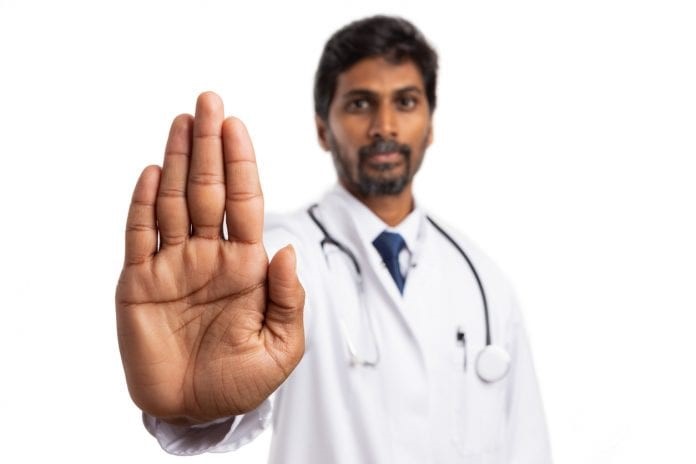
Not Charak Shapath or Hippocratic Oath but the 'Physicians Pledge' now

The government was accused of saffronising medical education in the country by replacing the centuries-old Hippocratic Oath with the Charak Shapath. But, the National Medical Commission (NMC), the country’s regulator for medical education and practices, seems to have unceremoniously dropped both these oaths and opted for ‘The Physician’s Pledge’, as laid down by the World Medical Association’s Declaration of Geneva 2017.
The NMC’s newly-released draft regulations – the Registered Medical Practitioner (Professional Conduct) Regulations, 2022 – for the professional conduct of doctors clearly does not include either of the two oaths.
In February this year, a large section of the medical fraternity were up in arms when the NMC recommended that the Hippocratic Oath should be replaced with the ‘Maharshi Charak Shapath’, in the new curriculum for MBBS courses in the country. Organisations such as the Indian Medical Association (IMA), the national representative platform of doctors of modern medicine, expressed their concern and took up the matter with health minister Mansukh Mandaviya.
However, the draft regulations under the NMC Code of Medical Ethics has now included ‘The Physician’s Pledge’, which reads as follows: As a member of the medical profession,
- I solemnly pledge to dedicate my life to the service of humanity
- The health and well-being of my patient will be my first consideration
- I will respect the autonomy and dignity of my patient
- I will maintain the utmost respect for human life
- I will not permit considerations of age, disease or disability, creed, ethnic origin, gender, nationality, political affiliation, race, sexual orientation, social standing, or any other factor to intervene between my duty and my patient
- I will respect the secrets that are confided in me, even after the patient has died
- I will practice my profession with conscience and dignity and in accordance with good medical practice
- I will foster the honour and noble traditions of the medical profession
- I will give to my teachers, colleagues, and students the respect and gratitude that is due
- I will share my medical knowledge for the benefit of the patient and the advancement of healthcare
- I will attend my own health, well-being, and abilities in order to provide care of the highest standard
- I will not use my medical knowledge to violate human rights and civil liberties, even under threat
- I will make these promises solemnly, freely, and upon my honour
Also read: Explained: What do Charak Shapath and Hippocratic Oath say?
The origin of the Physician Pledge and what it reflects?
The Physician’s Pledge that is part of the WMA’s Declaration of Geneva was adopted by the Second General Assembly of the WMA, Geneva, in September 1948. There were minor revisions over the years and the last amendment took place during the 68th WMA General Assembly in Chicago, in October 2017.
NMC’s draft regulations, released on May 23, have included this Physician’s Pledge from the Declaration of Geneva 2017 at the end of its 14-point code of ethics.
The text in the Physician’s Pledge reflects the changing relationship between patients and physicians and between physicians themselves. The pledge refers for the first time to respect the autonomy of the patient, which was not there earlier. There’s also a new obligation for respect between teachers, colleagues and students. Also, the pledge included an obligation on the part of the physicians to share their medical knowledge for the benefit of their patients and the advancement of healthcare.
Moreover, the physicians pledge to take care of their own health, their well-being and their abilities to provide care of the highest standard.
WMA President Dr Yoshitake Yokokura had said about this pledge when it was approved by them: “The new wording respects the unique character and significance of this Declaration, but focuses more on important ethical principles not in the current version and not expressed explicitly.”
“The life of physicians today is completely different to what it was in 1948 when the original Declaration of Geneva was adopted. Since then, the Declaration has become a core document of medical ethics and a modern version of the 2,500-year old Hippocratic Oath,” he said, adding that they hoped that the Declaration approved today will be used by all physicians around the world to strengthen the profession’s determination to maintain the highest standard of health care for patients.
Also read: Charak Shapath row: By firing Dean, DMK govt sends out strong signal to bureaucrats
What was the controversy over the Charak Shapath?
The controversy began after the NMC, suggested to medical colleges on February 7 that the Hippocratic Oath should be replaced by a “Charak Shapath”.
After a lot of hue and cry among the medical fraternity, an IMA delegation met Mandaviya, who had “assured that Charak Shapath will be optional and will not be forced to replace the Hippocratic Oath”.
Subsequently, on March 29, replying to an unstarred question by several MPs on “whether government intends to replace the Hippocratic Oath with the Charak Shapath”, the minister of state for health and family welfare Dr Bharati Pravin Pawar told Rajya Sabha: “As informed by the National Medical Commission, there is no proposal of replacement of Hippocratic Oath with Charak Shapath.”
Days later, however, on March 31, the NMC issued a circular, in which it said: “Modified ‘Maharshi Charak Shapath’ is recommended when a candidate is introduced to medical education”. The Charak Samhita is a medical pharmacopoeia and collection of commentaries and discussions on medical practices that dates back to the 1st-2nd centuries AD. It is considered the foundational text of ancient Indian medicine.
The NMC, however, seems to have dropped the Charak Shapath and decided to opt for the WMA’s Physician’s Pledge.

